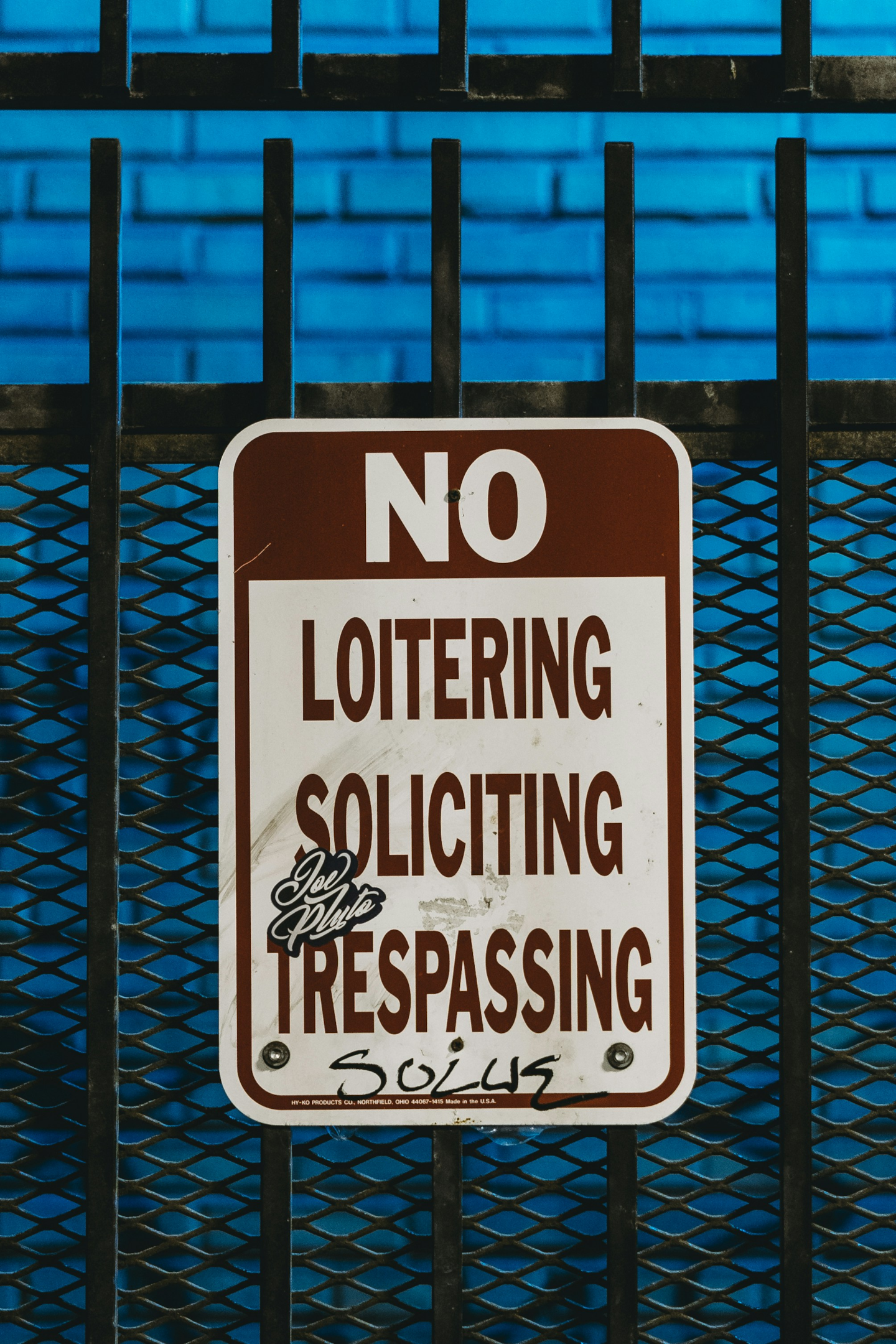Austin Criminal Trespass Attorney
Austin Criminal Defense Lawyer | ATX Legal
Criminal trespassing, although usually just a class B misdemeanor, can still impact your life. Probation conditions and court costs can be a real burden. At ATX Legal, we have a proven track record of successfully defending these types of cases. Experienced Austin criminal defense lawyer Rob Chesnutt understands criminal trespassing laws and will guide you through the process.
The good news is that there is often a path to dismissal for criminal trespass charges in Travis County. Don’t let a minor charge like criminal trespass affect your future. Fill out a contact form, or text 512-677-5003 for a free consultation.
Elements of Criminal Trespass
Under Texas state laws, the crime of trespassing trespassing is defined under Penal Code Section 30.05. The three essential elements of criminal trespassing in Texas include:
The person entered or remained on someone else’s property or in a building of another without effective permission.
The person had notice that the entry was forbidden, or;
The person received notice to depart from property, but failed to do so.
It’s important to note that by law, ‘notice’ can be a verbal or written communication by the owner, fencing or other enclosure obviously designed to exclude intruders or contain livestock, a sign posted indicating no trespassing, or the placement of identifying purple paint marks on trees or posts on the property. If a criminal defense attorney negates even one element, then by law it is not considered criminal trespass.
If you are reading up on trespassing laws, note that real property means land, while personal property refers to movable items like cars or phones. Trespass on land is a crime, while trespass to personal property is typically a civil liability.

Penalties for Criminal Trespass Under Texas Law
Criminal charges for trespassing under Texas state law is generally considered a Class B misdemeanor, and the penalties can include up to 180 days jail time. Other penalties include a fine of up to $2000 and restitution or community service. If the trespass occurred within a habitation, a shelter center, a superfund site, or on agricultural land within 100 feet of the boundary with a freshwater area, the charge can be elevated to a Class A misdemeanor. This carries additional penalties, with a potential fine of up to $4000 and/or up to one year in jail.
In cases where the trespass occurred on a protected property, like a place of burial or worship, on a nuclear power plant premises, or on a government infrastructure facility, the trespassing charge can be considered a state jail felony with even harsher penalties. It is punishable by a fine up to $10,000 and/or a jail sentence between 180 days to 2 years. Although jail time is rare for trespassing, it is more likely when elevated to a felony.
What is a trespass warning?
A trespass warning is a formal notice given by a property owner or law enforcement advising an individual revoking permission to someone else’s property. It can be issued verbally or in writing and serves as a clear indication that the individual is not welcomed on the property. Failure to comply with a trespass warning can be a factor in charging a person with criminal trespass.
A trespass warning can influence the outcome of trespass charges. If a trespass warning was issued prior to the alleged offense, it strengthens the property owner’s case as it establishes that the accused was aware of the prohibition, but chose to ignore it. However, if the trespass warning was not clearly communicated or is proved invalid, it could form the basis for a strong defense strategy. In the absence of a valid trespass warning, an individual may argue that they were unaware that their presence was unwelcome, thus challenging the intent element of the trespass charge.

Defenses to Criminal Trespass
There are several ways a defendant can challenge criminal trespass charges.
Lack of Notice or Warning: The accused person may argue that they were not given proper notice that they were not allowed on the property. This could be a lack of signage, a failure to communicate verbally, or an improperly delivered written notice.
Consent: If the accused person can prove that they had the consent of the property owner or someone with authority to be on the property, they may be able to refute the charge.
Necessity: In certain cases, the accused may argue that there was an immediate and pressing need to enter the property, such as to prevent a greater harm. This is known as a necessity defense.
Lack of Intent: Criminal trespass requires that the accused knowingly entered or remained on the property. If the accused can prove they were not intentionally entering the property, they may have a valid defense. It can also help negate the crime if the police officer did not give a chance to vacate.
The effectiveness of these defenses largely depends on the specifics of the case and the evidence available. A defense lawyer only needs to get to reasonable doubt to negate criminal charges.
Plea Bargaining For Criminal Trespassing
Plea bargaining plays a significant role in the resolution of criminal trespassing cases. Most of these cases do not make it to trial, as a negotiated plea can expedite the legal process and potentially reduce penalties. The accused party may negotiate with the prosecutor to plead guilty or no contest to lesser charges in exchange for a more lenient sentence or even dismissal of the charges.
For example, a trespassing charge may be downgraded to a class C misdemeanor that doesn’t appear on most criminal background checks. The success of plea bargaining depends largely on the strength of the defense, the circumstances of the offense, whether the defendant has committed prior crimes, and the discretion of the prosecutor.
Any plea should be entered voluntarily and with full knowledge of the implications. As always, it’s advisable to consult with your defense attorney when navigating plea bargaining negotiations.
Pretrial Diversion
Pretrial diversion is frequently utilized in criminal trespassing cases, largely due to the nonviolent and typically minor nature of the offense. This alternative to prosecution allows the accused party to avoid a conviction by fulfilling certain requirements set by the court, which may include community service, restitution, or attending educational courses.
Essentially, the defendant is diverted from the traditional criminal justice process and given an opportunity to demonstrate responsible behavior. After successful completion of the diversion program, charges are typically dismissed. However, failure to complete the required terms may result in the case being referred back to court for trial and a guilty plea or conviction may result.
Eligibility for pretrial diversion may vary based on jurisdiction, the specifics of the case, and the prior criminal history of the defendant. As with all legal matters, consulting with a legal professional is recommended when considering this option.
Frequently Asked Questions about Criminal Trespassing
Q: Can You Trespass on Private Property Open to the Public?
A: Even if a private property is open to the public, specific areas may still be considered private and off-limits without explicit permission from the owner. Trespassing can occur if you enter or remain on the private property without permission.
Q: How soon does a criminal trespass show up on my criminal record?
A: A criminal trespass charge can appear on your criminal record as soon as the arrest occurred. It usually shows on a background check within a week or two. A person convicted cannot have their record expunged, but if the criminal offense is dismissed, expunction is available.
Q: If I didn’t know I was trespassing on someone else’s land. Can I still be charged?
A: As long as there was proper signage and notice on the person’s property, ignorance of trespassing can be difficult to prove. However, if a person can show that they were unaware of the trespassing and had not received a warning, it can be a valid defense. Criminal trespass lawyers will sometimes be able to use this argument for a dismissal pre-trial.
Q: A friend or loved one was just arrested for criminal trespassing. How do I get them out?
A: If a friend or loved one has been arrested for criminal trespassing in Travis County, they will usually released via a personal recognizance (PR) bond. A PR bond is an agreement made with the court to ensure the defendant’s appearance at all future court dates. You typically do not need to go though a bondman. It is free except for a small administration fee, typically $20-$40.

Speak With a Criminal Defense Attorney
If you were allegedly caught trespassing and need legal assistance, don’t hesitate to reach out to our experienced criminal defense attorney. Even though jail time is unlikely, the wrong attorney can lead you to an outcome that causes problems for you in the future. Fill out the contact form below with your details and a brief description of your case. We will get back to you promptly.
Alternatively, you can text us at 512-677-5003. We’re available 24/7 and are committed to helping you navigate the legal system and keep your criminal history clean.